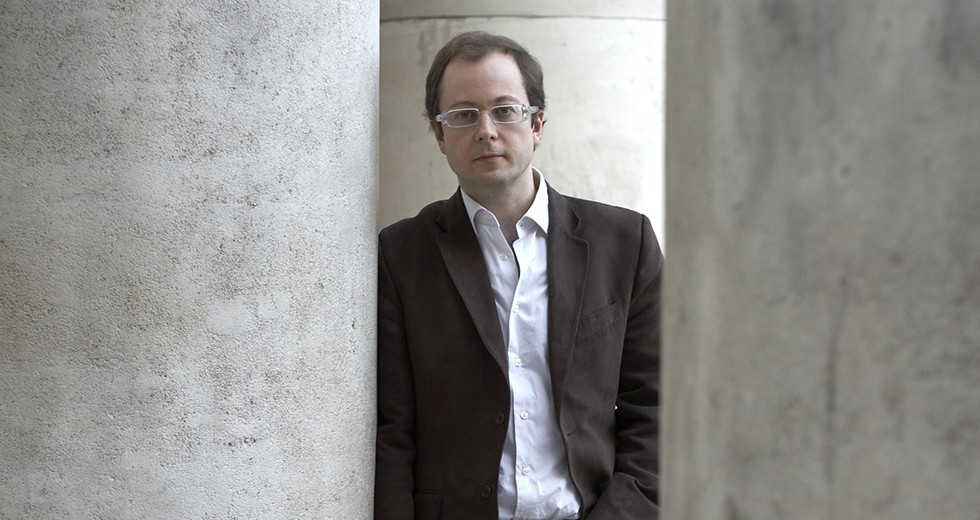
Pour sortir au jour (“Going Forth by Day”) is the original name of The Egyptian Book of the Dead. Those papyrus scrolls were placed near the mummy in order to help it achieve its journey to the hereafter and attain the light of Osiris. This book consisted of a series of prayers, magic formulas for opening doors, invocations and fabulous tales in service of the deceased. For in order to live this second birth and see the brightness of the Justified, a series of trials awaited the dead person. It is this spiritual journey that my concerto evokes: a journey from shadow and light to the land of Amenti, the paradise of the ancient Egyptians.
My score is laid out in five linked movements, in which is found the classic three-movement structure, except for the fact that the first and second movements are preceded by two ritual dances. These call for a small ensemble accompanying the solo flute like a memory of the baroque concerto grosso. I chose the instruments by analogy with the ancient instrumentarium: the two oboes and trumpet portray the aulos, the two harps and percussion (in which I favor period instruments: crotales, sistra, drum, whip ) and four solo violas evoke the sonorities of the hydraulic organs of the late period.
The Chicago Symphony Orchestra presents the world premiere of Connesson’s Pour sortir au jour in concerts March 5-8.
1. Danse processionnelle (“Processional Dance”): The funeral cortege crosses the Nile, taking the remains to the west bank of the river accompanied by this dance in seven beats. The whole movement, in which the solo flute is supported by the polyrhythms of the “Egyptian ensemble,” is written on a Hindu Shri mode abundantly transposed. Achieving the trance, the ensemble is suddenly covered by the large orchestra, which makes its entrance like a lightning bolt marking the passage from the other side of the mirror to the land of the dead.
2. Entrée dans la Douat (“Entrance into Duat”): This long movement is made up of six sections. The first evokes the difficult separation of the soul from its body. The solo flute seems increased by the flutes in the orchestra in the play of mirrors. The second section states the main theme of this movement in the soloist’s middle register, a theme of mystery and anxiety that will be followed by four variations. The first (“The World of the 12 Regions”) uses the mirror theme set with a complex polyrythm. The next variation (“The Flight of the Soul Bâ”) is a light scherzo in which the Bâ twirls and joyously visits its new universe. But very quickly, it hears the weeping of those unable to escape the serpent Apophis and the terrible Amut, the devourer of souls, this new variation (The Serpent Apophis) being based on a motif in inflection like a lament. Finally, in the last variation (“Light of the god-of-the-stopped-heart”) the deceased finds himself before Osiris, whose light invades the whole orchestra like a tidal wave.
3. Danse de la Justification (“Dance of Justification”): In this hesitant, mysterious dance, we again find the small ensemble from the beginning and the Shri mode, but without the solo flute. Written on a five-beat ostinato, this is music of expectation preparing for the Judgment.
4. La Balance des Dieux (“The Scales of the Gods”): This slow movement, which reflects the capital moment of psychostasis when the dead person’s destiny will be decided, unfolds like an interrupted song: a serious theme will come back three times and, each time, the flute’s lyrical élan seems to break on a mechanical clock in the form of an ostinato vanishing into silence. Then judgment is rendered, and, on a gentle G-flat major chord, the flute is welcomed into the splendor of Osiris.
5. Danse dans les champs de Ialou (“Dance in the fields of Ialou”): In this final dance, the “Egyptian ensemble” carries on a dialogue with the large orchestra for the first time. A nervous, rhythmic theme in the Shri mode is stated by the soloist answered by a second theme — this one tonal — declaimed by the whole orchestra. This dance of joy is that of the Justified who, in the fields of Ialou, will see souls take possession of their legs to run toward the happy sojourns, experience the winds bearing the fluids of the infinite, thanks to which the heavens unite with the planets, hear the souls of the pharaohs clucking like the geese of Geb and dive into the celestial Nile.